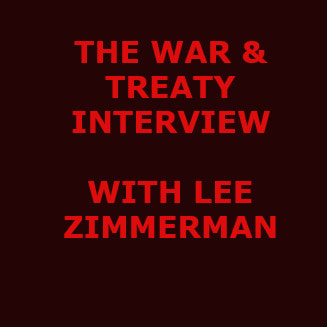|
The Breadcrumbs Widget will appear here on the live site.
3/24/2023 The War & Treaty Interview
The War and Treaty (from the album available Lover’s Game on Mercury Nashville)
With Their New Album, The War and Treaty Find Common Ground By Lee Zimmerman The husband-and-wife duo of Michael Trotter Jr. and Tanya Trotter, popularly known as The War and Treaty, could be considered something of a phenomenon. Over the space of three years, two albums, and two EPs, they became one of the most talked about and highly lauded duos in Americana realms. Their combination of Gospel-like revelry, contagious and commanding R&B melodies, and vocal variety has given them a persistent presence, one enhanced not only by the joyful music they make, but also the sheer power of their personalities. Now with a new album, the somewhat surreptitiously titled Lover’s Game, this dynamic duo elevates their efforts, probing the deeper issues of marital relationships and the difficult divide that often intrudes on even the truest intents. ‘A cliche answer would be life’ Michael Trotter replied when asked about the impetus for the new album. ‘You can't really avoid it. Live long enough, you're gonna have to come to grips with what love entails in some form or fashion. Tanya, and I really just wanted to dig deeper, and then that involved the things we love, the things we love to hate. And that's what we intended with this record….traveling all the way through down to the end, with a heavy heart and really asking the listener to continue the journey with us. Because if you have a heart for us, we have a heart for you and we’ve given your heart a kind of thumbs up throughout the album. It’s kinda like resistance is the next the next portion of the journey. So that's really the entire gist’. In that regard, Lover’s Game is an unfailingly honest album, one that deals absolutely realistically with the ups and downs of real relationships and the tenuous situations that most people inevitably find themselves in. ‘Normally when we create it, it's one of us or the other leading the way’ Michael went on to say. ‘But this time, we were extremely intentional about doing this process together, from start to finish. And there were many, many arguments, many disagreements. We had to check ourselves a couple of times, because I wanted to say one thing and she wanted to say another, but ultimately, we learn how to speak together. We learned that if there's something we both want to say at the same time, it's okay to say it together. That's what I feel we accomplished, or at least tried to accomplish, but that was difficult, because there's a third voice there, which was [producer] Dave Cobb. So, we had one thing to say and then Dave's got something to say and just because he's producing, that doesn't mean that he has a say so. So, we had to navigate the equation, and before you know it, we were all trying to say the same thing. So, that's where that that process would lead us’. It’s suggested that in a sense, Dave Cobb also offered his services as a marriage counselor. ‘He's a good guy, a great, great producer, one of the greatest’ Michael insists. ‘And I think what makes him special is that he knows when to get in the way and he also knows when to get the hell out of the way. That was what was key for The War and Treaty. We've been fortunate to work with producers in that way. We worked with Buddy Miller in the past. He's the greatest. No one doesn't like Buddy. We've been very fortunate to come across some great, great producers. But when you look at what Dave Cobb is able to do, he’s able to keep you honest to who you truly are, and then pull out what he feels is the meat of the entire meal’. Nevertheless, the duo deserve credit for baring their emotions and their relationship in general, it is all its tangles and imperfections. ‘We talk about it a lot’ Tanya suggested. ‘You never know what your project is going to be when you get out there as an artist and give in your vulnerability. But I think when we came out and we put out records, we were just very vulnerable. And people were, I believe, at a point in their own lives, where they just wanted to see something that was real. And you know, we're always saying we're overweight, we sweat, we get loose on stage, we come totally undone. We live in a society where everything is so perfect, and that's really not life. That’s not how we as humans operate. We're not perfect, and we're never going to be perfect. So yes, in a way, it was shocking. But at the same time, I think that humanity is all on the same wavelength. We were willing to be vulnerable, because in a lot of ways, we’re still going through the trenches’. In that regard, it could be argued that the pair are ambassadors for the average individual, anyone seeking answers of their own. Tanya tends to agree. ‘I would have to say, yes to that’ she suggested. ‘When you look at our story, it's not a perfect story. We're a blended family. So, we've had lives before one another. And we started over again, like a lot of people are starting over again. If you look at the aftermath of the pandemic, people have left jobs that they've been at for 20 years to become farmers or to do something that they've always wanted to do. They've taken the risk. That's what we did. We were homeless, we took the risk to do something that we really, really believed in. And I think that people can see how that resonates with the American story, of Michael going into the military, and him dealing with PTSD, me being there for him in our family, being there with him traveling with our children. we can hit every aspect of what it is to be a family. So, I think when people see us and they dig into our story, they really can see themselves because everybody's just trying to make it and to be happy and build the kind of family that they want to have, to have a nice home living a decent community’. That extends to other aspects of life as well. ‘There’s the overweight thing’ Michael mentions. ‘I'm walking around here without my shirt’. Of course, that sort of honesty entails a certain responsibility, and in that sense, The War and Treaty might also be considered as representatives for people of color who have managed to bridge a divide in a sometimes-stereotypical world. ‘We were able to march across the Edmund Pettus Bridge with John Lewis‘ Michael recalls. ‘It was his final march in 2020. He was beaten on that bridge. So I believe that me and Tanya have the responsibility, the musical responsibility to sing and have a voice for the voiceless. That responsibility was given to us. And so be it. That's cool. I do think about the idea of being a voice of unity. John Lewis said that a life well lived is a life that can bond, two opposing lifestyles to one another’. ‘When you come to a War and Treaty show, you're gonna have fun’ Tanya mused. ‘But at some point, you're going to have to look at yourself through a mirror of love, and see if you're measuring up, because that's what we should all want to measure up to. If I lost my voice today, I wouldn't stop thinking beyond that stage, still trying to unify our audiences, still trying to unify our divided United States of America, still trying to unify on a global scale. The only reason why we're even doing these records is because they give us a platform to say that, guess what? We're all brothers and sisters. That's what matters’. ‘We are the answer to our own problems’ Michael added. ‘And I feel that with this album, that's what we're trying to say. We're trying to connect people and connect them through our music. That's exciting to me. Yes, I want that responsibility. I was born for that. To that end, we're ready’. (by Lee Zimmerman) Listen and buy the music of The War & Treaty from AMAZON For more information head on over to The War & Treaty website The Blog Tags widget will appear here on the published site.
Tags:
0 Comments
The Recommended Posts widget will appear here on the published site.
Leave a Reply. |
- Home
- Top Ten
- It's All Music Radio
- Latest Videos
- All Reviews
- Breaking Thru
- Who's Playing Near Me?
- Seen & Heard
- About
- Contact
The Category Navigation Widget will appear here on the live site.
|
To submit music, please mail a copy of your CD to the following address:
Danny McCloskey The Alternate Root 1717 East Vista Chino Ste A7 PMB 302 Palm Springs, CA 92262 |
Contact Us |
©2021 The Alternate Root All Rights Reserved
website by Jim Cortez [email protected]
website by Jim Cortez [email protected]


